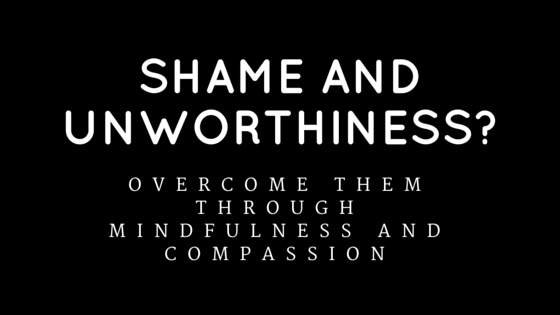
Too many people have a profound sense of being insufficient or unworthy in some way--of being broken, flawed, or different from others. This feeling of shame or unworthiness can trap people in social, spiritual, physical and psychological disease. People feel not they made a mistake, but that they are the mistake, not that they have problems, but that they are a problem. Such deep-seeded feelings of unworthiness may come from experiences in childhood and can be perpetuated by a western culture that values material wealth and outward appearances and which in turn breeds shame and separation. Messages that we do not have enough, do not do enough, and that essentially, we are not enough, continually pelt our sense of worth.
Rather than accepting themselves as they are, some people seek to numb their feelings with sex, shopping, alcohol, web surfing, video gaming, drugs or food addictions. Or perhaps they over-work and seek achievement in an effort to earn the admiration and praise of others. Focusing on the other people’s failings and inadequacies is another method of dealing with one’s own imperfections. All of these methods of dealing with our false sense of unworthiness hinder our ability to enjoy healthy, loving relationships. Concealing our inadequacies from others becomes our focus and stifles our ability to see and experience the beauties of life.
“The curious paradox is that when I accept myself just as I am, then I can change.”
Carl Rogers
The key to changing how we feel about ourselves and letting go of guilt and shame is to accept who we are right now, both our good points and our bad points. We become aware of the whole package--of everything we are--and recognize that we, right now, are valuable. We practice mindfulness, or in other words, see ourselves and our situation clearly, as compassionate, third-party observers. We view ourselves in the present, neither fretting about future problems nor ruminating about past mistakes. And we do not seek to hide from nor numb ourselves. Instead, we permit ourselves to experience both the pleasant and the unpleasant aspects of our lives from moment to moment, offering to ourselves compassion, gentleness and care rather than judging or shaming ourselves . When we want to escape, or we grasp for something to distract us from pain and grief, we view our experience without condemnation, but as a parent would an injured child, with kindness, sympathy, patience and love.
When we fail or others reject us, our feelings of being unworthy or of shame may lead to an obsessive brooding over the future or the past. We may blame ourselves and others. How do we escape this negative fog of despair? By being both compassionate to ourselves and by being mindful. This means accepting ourselves with our pain and discomfort. It means realizing that we are more than our reaction to our present experience. By accepting ourselves and who we really are, we become free of the trap of false unworthiness and shame.
Some might argue that being mindful and accepting of our true selves is defeatist resignation, or perhaps a way of justifying self-indulgence. However, accepting ourselves does not mean we allow our own inappropriate actions, our own bad habits, or the misbehavior of others to continue. Rather, acceptance and mindfulness allow us to clearly see and understand our situation, a prerequisite to real and effective change.
An easy technique to become more mindful is practicing “the art of pausing”. Simply take a few minutes each day (or whenever you feel extra vulnerability or stress) to pause and become aware of your surroundings, your feelings, your thoughts, and of how your body is reacting. This exercise of stopping and becoming aware moves you out of the worry and stress of what may occur in the future, or out of the feelings of regret and guilt that haunt the past, and focuses you in the present. You thus become aware not only of how you are reacting to the inescapable pressures of life, but also to the beauty and wonder of your present existence.
By pausing, you stop yourself from running away, your awareness increases, and you find access to wisdom that may otherwise be hidden. Your focus can begin to change from what you don’t have and what you are not to what you do have and what you are. Feelings of wholeness, connectedness, and wellbeing replace the sense of unworthiness and shame. You feel right with the world. You recognize that you are… worthy and enough.
For help in overcoming sex addiction and pornography addiction, call Paradise Creek call (855) 442-1912.
